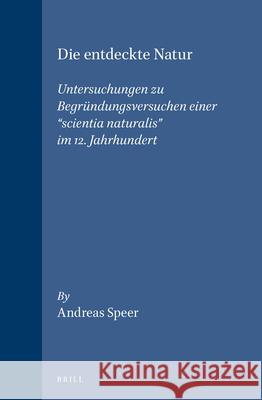Die Entdeckte Natur: Untersuchungen Zu Begründungsversuchen Einer "Scientia Naturalis" Im 12. Jahrhundert » książka
Die Entdeckte Natur: Untersuchungen Zu Begründungsversuchen Einer "Scientia Naturalis" Im 12. Jahrhundert
ISBN-13: 9789004103450 / Niemiecki / Twarda / 1995 / 380 str.
Die Entdeckte Natur: Untersuchungen Zu Begründungsversuchen Einer "Scientia Naturalis" Im 12. Jahrhundert
ISBN-13: 9789004103450 / Niemiecki / Twarda / 1995 / 380 str.
(netto: 686,38 VAT: 5%)
Najniższa cena z 30 dni: 720,70
ok. 30 dni roboczych
Dostawa w 2026 r.
Darmowa dostawa!
This volume deals with the "discovery of nature" in the 12th century, focusing on its epistemological consequences for the speculative understanding of nature. A symbolic understanding is gradually replaced by an original interest, guided by reason alone, in the structure, constitution and process of the physical world. The growing knowledge of the "natural world" - which took the form of a systematic knowledge of causes - parallels attempts to establish a coherent "scientia naturalis." The main protagonists of the so-called "School of Chartres" characterize the goal of this "philosophia mundi" by reference to Timaeus 28A, as a search for the "legitimate cause and reason" of natural beings and structures. This incremental discovery of nature is linked to the development of physics as a science of nature; it leads to an "eveil metaphysique" (M.D. Chenu) and must be understood as one of the most important causes for the growing interest in Aristotle's writings (and in particular with the "libri naturales"). The discovery of nature in the 12th century thus provides an important philosophical impetus for the wider assimilitation of the Aristotelian corpus. At the same time, it leads to the development of an original and distinctively medieval model of natural philosophy.











